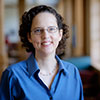This article is more than 5 years old.
Honestly, they could’ve renamed this the “Patron-Driven Acquisitions Conference,” given the many talks on that topic.
Rick Anderson’s opening plenary promoted the opposite of the Big Deal: The Tiny Deal, or, single article purchases. He reported two surprises with his library’s Espresso Book Machine:
- An interest in self-publishing, especially for family histories.
- Demand for blank books paired with a cover image taken from their special collections.
I attended two of the patron-driven (PD) acquisitions sessions. One featured three librarians from BYU discussing their experience. Out of 18,000 records loaded, 326 books were purchased. That’s not much, especially when you factor in their FTE of about 30,000. They also used a 583 note on the purchased titles to distinguish them from non-purchased ones. Interesting idea or too much work? Since our current plans are to use distinct back-end location codes that will all show publicly as “Website,” I wonder if public service staff and liaisons need a way to tell one kind of e-book from another without using the Cataloging Module.
The other PD session featured a librarian, a publisher, a YBP rep, and an EBL rep. Becky Clark from Johns Hopkins UP reported on an AAUP survey about the impact of PD on publishing. 56% of respondents believe they will publish the same number of books, but 31% foresee a decline in publishing once PD matures. While Michael Levine-Clark from the University of Denver spoke, I was furiously doing math in the margins of my program. I was trying to calculate how much WFU would spend on a PD program if our usage pattern were like Denver’s. The EBL rep, David Swords, briefly flashed up data from multiple customers that I was salivating after until…
Meanwhile, back at the ZSR, Derrik was independently emailing questions to David, who suggested a quick Charleston meet-up. Derrik referred him to me. Since I now have a smartphone, I was checking my email between sessions, and I arranged to meet David that same afternoon. As a result of that meeting, he sent us the data I sought. Derrik, Lauren and I have used that information to help forecast what might happen when we start our own PD service.
I also heard our Duke colleagues talk about their experience lending Kindles and Nooks and buying content for them. Their approach was very similar to ours but, as you might expect, on a larger scale, with IIRC, 41 devices available. Although they sought out other alternatives, they had no better solution than maintaining a separate spreadsheet of which titles were on each device. [Not] paying taxes on the purchases has been a big hassle lately.
One Friday session featured Jon Orwant from Google Books. He spoke about their metadata challenges, what they’re doing to address these challenges, and research uses of the Google Books Corpus. His discussion of corpus linguistics uses was the highlight of the entire conference for me. Corpus linguistics is a methodology which uses computers to mine a large body (=corpus) of text and find out something interesting about language. He cited the verb ‘to sneak’ and the use of the irregular vs. regular past tense. (As in ‘she snuck/sneaked up on me.’) Researchers can mine the Google Books corpus to find out the frequency of each variation, how the frequency values have changed over time, etc. Google has also funded researchers who want to track the use of words like ‘labour’ across Victorian literature. The corpus can also be analyzed for phrases. Mr. Orwant showed a list of 3 word phrases (trigrams) that appear much more often in older books (like ‘vexation of spirit’) vs. newer books (‘health care professionals’).
Google came up again in the Saturday plenary sessions. Two lawyers discussed current cases that could have a high impact on our work. As we were updated on the status of the Google settlement, I recalled that the settlement was announced about a week before the conference two years ago and they still haven’t finalized it. I also heard updates on SkyRiver vs. OCLC and the Georgia State e-reserves case. Omega Watch vs. Costco was not a case I expected to hear about, but if Omega wins, some of our rights to circulate books and especially foreign-made videos could be threatened.
My final act on Saturday was participating as a panelist in a session moderated by Elisabeth Leonard and our Readex rep, Erin Luckett. The goal of the panel, “Straight Talk,” was better communication between vendors and librarians.
All in all a great conference. Stop by my office if you want to hear more details about the sessions or especially linguistics!

2 Comments on ‘Carol at the Charleston Conference’
Sounds like a great conference. Interesting, too, about Duke’s ereader approach!
I’m interested in the Denver experience. I’ve heard a little bit about it through ULG.